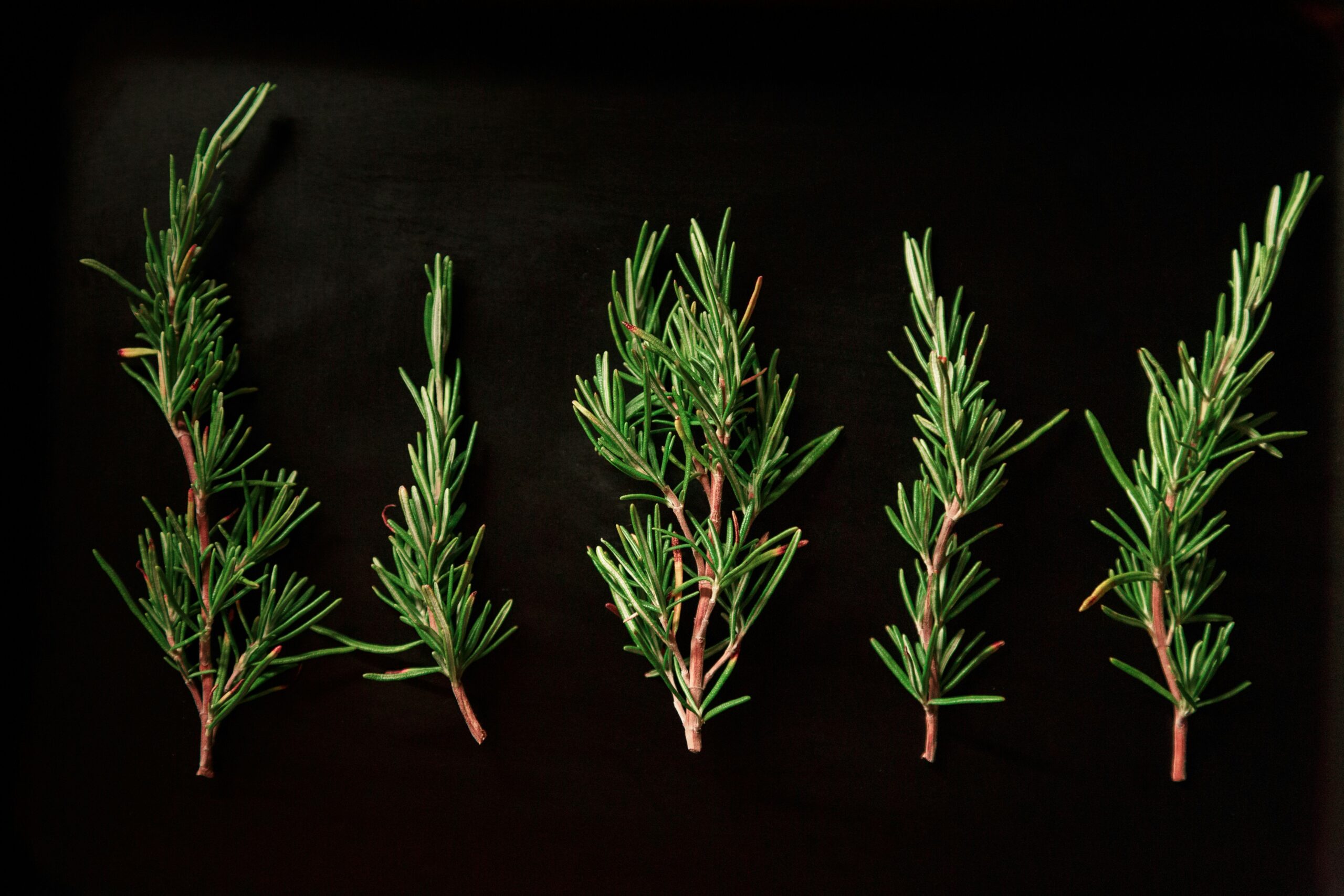Rosemary Essential Oil Benefits, Rosemary Essential Oil Uses & More

- What Is Rosemary Essential Oil? Where Does It Come From?
- Rosemary Essential Oil Uses Explained
- Rosemary Essential Oil For Hair Health
- What Is The Hot Oil Method And Why Is It Beneficial For Your Hair?
- Rosemary Oil For Hair Growth
- Rosemary Oil For Natural Lice Treatment
- Rosemary Essential Oil Benefits For Skin
- Rosemary Oil For Acne
- How To Make Rosemary Essential Oil
- Conclusion
I’m quite sure that we’ve all encountered rosemary at some point in our lives. Whether in the garden, kitchen or as an essential oil, it has a delightful, aromatic, floral, and somewhat piney smell. The smell of rosemary is very nostalgic to me. It always takes me back to my childhood years. In fact, it is also known as the ‘herb of remembrance’.
Growing up on a farm, I remember helping my mother tend to her herb garden on a regular basis. She used to surround the herb garden with rosemary bushes as a way of keeping pests out, as they’re naturally pest-resistant. She did this in order to encourage bee activity in the springtime.
Rosemary is an evergreen shrub, so it looks nice all year long and provides a consistent yield all year round. We had so much that it was a common ingredient in most of my mother’s dishes and baking experiments. It was only later in life that I actually encountered rosemary oil for the first time. The smell immediately took me back to that herb garden all those years ago. It’s a powerful and potent essential oil and should be used sparingly. But it is incredibly effective and has many uses.
From aromatherapy, skincare, and massage oil, to a natural disinfectant, lice prevention tool, and immunity booster, rosemary essential oil is really a testament to the strength and versatility of natural products. A real gift from the basket that nature provides for us.
What Is Rosemary Essential Oil? Where Does It Come From?

The rosemary herb.
The rosemary bush is native to the Mediterranean regions and was used during the time of the Roman and Greek empires. In fact, its name is derived from the Latin word Rosmarinus officinalis. Rosemary directly translates to ‘dew of the sea’ (a fun Google fact) and has its place in Greek mythology. According to Natural History, written by the historian Pliny, Aphrodite (the goddess of beauty) was born from the sea draped in rosemary.
As I mentioned in the previous paragraph, rosemary is an evergreen shrub that is easy to grow and drought-resistant. This makes it ideal for cultivating on a large scale. Because of this, rosemary is grown and cultivated all around the world. Some of the largest suppliers are in the United States and Europe. However, France and Spain have become the largest suppliers of rosemary.
You might be wondering how rosemary essential oil is made. Rosemary oil is the pure extract that is derived from the bush via a variety of different extraction methods. The most commonly utilized method for extracting rosemary essential oil is through a process known as steam distillation. The oil separates from the organic matter by the effects of high pressure caused by steam in the distillation chamber.
Heat breaks down the organic matter, and vapor carries small particles of essential compounds to the condensation chamber. Droplets form in the cooling process in the form of pure extract oil. Because of its popularity and large-scale cultivation, it is very affordable and should cost less than $10 per 10 ml on average.
Rosemary Essential Oil Uses Explained
There are many uses of rosemary essential oil. It can be used to treat everything from the flu and the common cold to headaches and nausea. It works well as a mild analgesic and also has strong natural antioxidant properties. Consequently, it is great for helping you detox your system and stay healthier for longer. However, the beneficial uses of rosemary oil don’t just stop there.
About 2 months ago, I accidentally clipped my leg on a branch whilst cycling on an off-road course. The cut wasn’t anything severe. However, it was an open wound and I was a bit worried about a possible infection.
Whilst on the trail, I simply applied a Band-Aid that I had with me in my bag. But when I got home, I took a warm shower and gently applied a few drops of rosemary essential oil (and a little lemongrass essential oil extract) to the wound with some cotton wool and dressed it neatly. The oils worked immediately and I felt the light sting of antiseptics going to work on my wound.
I applied the solution twice daily. Within a week, the wound had healed very well and there were no signs of infection or long-term scarring whatsoever. What a win! Now I carry a mixture of rosemary oil and lemongrass oil in my bag whenever I go for a ride. If you’re anything like me, you never know when you might need it.
Rosemary Essential Oil For Hair Health

Rosemary can give your hair a thicker-appearance.
Essential oils are rapidly becoming commonplace in treating and sustaining hair health in both men and women. When used correctly, their natural qualities have amazing and lasting benefits on hair follicles and the scalp. The best part is that there are no side effects. And no high prices either! A lot of people worry that using essential oils will leave their hair feeling messy and oily. The key is to use the right oils for the right reasons and ensure that you follow the correct methods when it comes to applying the oils to your hair.
Many benefits of rosemary essential oil for hair comes from its natural antioxidant and anti-inflammatory properties. You can apply it to your hair in the form of a hot oil treatment or as an active ingredient in a DIY conditioner. It will help relieve your scalp of any inflammation (which is normally caused by poor diet or circulation problems) that may often lead to a dry and itchy scalp. These symptoms are often the root cause of dandruff.
So, essentially, it’s a healthy alternative to costly anti-dandruff shampoos that often dry your hair follicles out or can leave your hair with fewer nutrients and less volume.
What Is The Hot Oil Method And Why Is It Beneficial For Your Hair?
The hot oil method essentially involves heating rosemary essential oil with a carrier oil such as coconut or castor oil. After mixing the oils, let them cool until you can handle the mixture without burning yourself. Then, simply massage the concoction into your hair, starting from the scalp and working your way downwards.
After 15 minutes, be sure to wash the mixture out of your hair by shampooing as per normal (preferably using a natural shampoo product or conditioner – the fewer ingredients, the better). By utilizing this method, the natural antioxidants and conditioning agents penetrate the hair follicles much deeper. This will strengthen and nourish the hair from the core.
By utilizing the hot oil technique, you also remove any excess oil that may remain in the hair follicles or on your scalp. The excess oil often leads to greasy or ‘clumpy’ hair.
Rosemary Oil For Hair Growth
Rosemary essential oil is very useful for promoting hair growth when it is used correctly. In fact, it forms the basis of many natural (and typical pharmaceutical) products aimed at stimulating hair growth or slowing/preventing hair loss. Generally, over-exposure to air pollution or the constant use of chemical treatments on your hair can lead to the buildup of free radicals in your follicles and scalp. Free radicals will block up your pores and can even lead to poor blood cell circulation when left untreated for a long time.
This could slow hair growth and in some cases even lead to hair loss. Rosemary is rich in natural antioxidants which will help to encapsulate and remove free radicals.
One main cause of alopecia in men is based on a biochemical process that may occur anytime after puberty. Essentially, there is an enzyme in your hair follicles (known as ‘5-alpha-reductase’). This enzyme converts the testosterone that your body produces into a hormone known as DHT (dihydrotestosterone).
The DHT becomes stuck in the base of your hair follicles and slows your hair’s natural rate of growth. It can eventually even ‘choke’ the follicles, causing them to fall out or die off at the stem. Massaging rosemary oil into your scalp will inhibit the production of DHT. In turn, it allows the hair to grow at a steady rate and ensures long-term health.
Rosemary Oil For Natural Lice Treatment

Rosemary also helps with lice!
You might be surprised to discover that you can also use rosemary essential oil for lice. That sudden surprise that your kids come home from school with is the stuff of every parent’s nightmares. Each sheet, doll, etc, must be decontaminated, and your kids must stay home until they’re no longer a threat to others. Well, luckily, rosemary oil is here to save the day. Many people believe that it is best to use rosemary oil for a natural lice treatment. Yet in reality, it’s actually a handier tool in lice prevention than it is in lice treatment.
Rosemary oil helps clean your scalp and regulate your body’s production of sebum. This can, in fact, help minimize the recurrence of lice in hair. So if you’ve had one too many experiences with lice recently, you will want to give rosemary oil a try.
Whether you know that there are lice going around your child’s school, or you simply want to be proactive, try this tip. Each morning, spray your children’s hair and knapsacks with a DIY lice repellent. Simply mix 20 drops of lavender oil with 20 drops of rosemary oil. Combine this with 4 ounces of water and place the mixture in a spray bottle for easy and hassle-free application.
Tea tree oil is a better option if you’re looking for lice treatment. You can even add it to the DIY spray above. Just know that if you do so, the smell of the spray might not be as pleasant.
Rosemary Essential Oil Benefits For Skin

Rosemary Essential Oil For Skin.
As I mentioned before, rosemary essential oil is a strong natural antiseptic. It’s an ideal topical treatment for open wounds and in preventing bacterial infections such as athlete’s foot. Like I said, I always carry a bottle of the stuff around with me whenever I go cycling. The same applies to those who go to the gym often or workout a lot.
There are so many benefits found in rosemary essential oil for your skin health. The oil has a pleasant and long-lasting aroma and can be an effective natural roll-on deodorant. It not only makes your pits smell good, it kills germs or bacteria that linger after a workout. This means that you’ll smell fresh and feel good for longer. There’s no risk of staining your clothes or drying out your skin. This happens quite regularly with most standard roll-on types.
Try applying rosemary oil to areas afflicted by muscle pain. It will improve blood circulation, alleviate you of direct pain, and will leave your skin balanced and moisturized. Rosemary is also great for targeting cellulite and stretch marks. The plant’s natural ability to improve blood circulation means that your body is able to flush out toxins more regularly.
The flushing out of toxins leads to healthier skin. Helping blood circulation improves skin elasticity and ensures that your skin rehydrates quicker – helping to speed up the healing process. Rosemary acts as an antirheumatic agent. This means that it can help reduce joint pain often caused by heavy lifting or rheumatism.
Rosemary Oil For Acne
The antibacterial and anti-fungal properties of rosemary oil mean that it can remove any germs or excess debris (free radicals) that may get stuck to your skin and build up over time. This buildup of debris and dead skin cells (something that happens every day and is unavoidable), coupled with an excess of sebaceous oil produced by naturally oily skin types, generally leads to blockages. This causes blemishes on our skin such as blackheads and can eventually lead to acne.
By washing your face regularly with warm water and gently applying the rosemary oil with cotton wool to the affected areas, you essentially moisturize and tone your skin while allowing the antibacterial qualities to take effect and kill off any germs. However, it is important to note that skin conditions like acne aren’t always treatable entirely from a topical approach. It is important to ensure that you are getting enough rest on a daily basis and that your body is regularly hydrated (at least 2 liters of H2O a day can help keep the acne at bay).
However, rosemary is effective in treating topical skin conditions such as psoriasis and eczema. One of the many benefits of the essential oil is that it conditions and moisturizes the affected area as well as fights inflammation and removes excess skin cells. It’s a wonderful natural replacement for the countless pharmaceutical creams and lotions that cost a small fortune and often have severe side effects.
rosemary oil- so many benificial uses! #antimicrobial #essentialoil pic.twitter.com/uW7pLf2sxM
— SF Massage Supply (@SFMassageSupply) February 17, 2017
How To Make Rosemary Essential Oil
There are two really simple ways to produce your very own rosemary essential oil in the comfort of your own home, and I’ll explain both to you briefly!
Option 1
- Place 1 cup of rosemary leaves in a slow cooker and add 2 cups of sunflower oil to that, covering the oil.
- Set the slow cooker to a low heat and allow it to simmer for 6 hours.
- Once the time has elapsed, filter the oil through a sieve or cheesecloth filter. The oil that remains is what you’re after.
Note that if you don’t have a pressure cooker, you can also bring a medium-sized pot of water to a simmer (not boiling) and place a heat-resistant glass bowl on top of that with the rosemary and sunflower oil inside. Then cover it with a lid or thick cloth.
Option 2
The second option is really simple, it just takes a lot longer to do. Place a cup of rosemary in a sealable glass container and then fill the container with your carrier oil (extra virgin olive oil also works well). Then simply leave the jar on a sunny windowsill or outside in the sun for about a week. Filter the oil through a sieve or cheesecloth and voila! You’ve got yourself some rosemary oil.
Conclusion
Rosemary has played a real part in my life. And that’s even outside of healthcare and my passion for natural products. By learning how this plant plays such an important role in nature firsthand, I gained my first insights into the workings of the so-called ‘natural way’ as a child. An experience like that is truly priceless. On the other hand, the logical adult in me is inspired by how much influence a simple herb has on the history of our species.
From inspiring myth and legend to healing those affected by all means of ailments, rosemary is more than just an herb. It’s really a solution, a tool – perhaps even a symbol. A symbol of how if we take the time to really focus on our surroundings and our environment, we’ll realize that everything we’ve ever really needed is quite often right in front of eyes, waiting to be discovered, utilized, or harnessed. Its ability to heal, reduce inflammation, and treat acne, hair, lice, and more, is truly wondrous.


